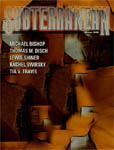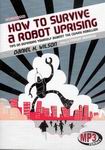
Received some nice goodies this week at SFFaudio HQ.
 The Caves of Steel
The Caves of Steel
By Isaac Asimov; Read by William Dufris
6 CD, 7 hrs – [UNABRIDGED]
Publisher: Tantor Audio
Published: 2007
ISBN: 9781400104215
It’s nice to see this SF classic get the audio treatment.
A millennium into the future, two advancements have altered the course of human history: the colonization of the galaxy and the creation of the positronic brain. Isaac Asimov’s Robot novels chronicle the unlikely partnership between a New York City detective and a humanoid robot who must learn to work together.
 His Majesty’s Dragon
His Majesty’s Dragon
By Naomi Novik; Read by David Thorn
5 CD, 6.5 hrs – [ABRIDGED]
Publisher: Random House Audio
Published: 2007
ISBN: 9780739354131
Aerial combat brings a thrilling new dimension to the Napoleonic Wars as valiant warriors rise to Britain’s defense by taking to the skies . . . not aboard aircraft but atop the mighty backs of fighting dragons.
When HMS Reliant captures a French frigate and seizes its precious cargo, an unhatched dragon egg, fate sweeps Capt. Will Laurence from his seafaring life into an uncertain future–and an unexpected kinship with a most extraordinary creature. Thrust into the rarified world of the Aerial Corps as master of the dragon Temeraire, he will face a crash course in the daring tactics of airborne battle. For as France’s own dragon-borne forces rally to breach British soil in Bonaparte’s boldest gambit, Laurence and Temeraire must soar into their own baptism of fire.
 For a Few Demons More
For a Few Demons More
By Kim Harrison; Read by Marguerite Gavin
14 CD, 17 hrs – [UNABRIDGED]
Publisher: Tantor Audio
Published: 2007
ISBN: 978006788384
Despite dating one vampire and living with another, Rachel Morgan has always managed to stay just ahead of trouble…until now. A fiendish serial killer stalks the Hollows, claiming victims across society, and the resulting terror ignites a vicious Inderland gang war. And when the vampire master Piscary is set free and the demonic Algaliarept dares to walk openly under the sun, even Rachel Morgan can’t hide forever.
 Quantico
Quantico
By Greg Bear; Read by Jeff Woodman
11 CD, 13.5 hrs – [UNABRIDGED]
Publisher: BBC Audiobooks America
Published: 2007
ISBN: 9780792748441
It’s the second decade of the twenty-first century, and terrorism has escalated almost beyond control. The Dome of the Rock in Jerusalem has been blown to bits by extremists, and, in retaliation, thousands have died in another major attack on the United States. The War on Terror has reached a deadly stalemate. Now the FBI has been dispatched to deal with a new menace. A plague targeted to ethnic groups–Jews or Muslims or both–has the potential to wipe out entire populations. But the FBI itself is under political assault. There’s a good chance agents William Griffin, Fouad Al-Husam, and Jane Rowland will be part of the last class at Quantico. As the young agents hunt a brilliant homegrown terrorist, they join forces with veteran bio-terror expert Rebecca Rose. But the plot they uncover–and the man they chase–prove to be far more complex than anyone expects.
posted by The Time Traveler of the Time Traveler Show

 Subterranean Press, which produces the “Subterranean Online” magazine, is proving itself a reliable source for excellent (and FREE) audiobooks. The latest proof of this comes from the
Subterranean Press, which produces the “Subterranean Online” magazine, is proving itself a reliable source for excellent (and FREE) audiobooks. The latest proof of this comes from the  Trunk And Disorderly
Trunk And Disorderly










 Third, Wilson is the featured guest on The NeoFiles Podcast (Show #21). The MP3 for which is right
Third, Wilson is the featured guest on The NeoFiles Podcast (Show #21). The MP3 for which is right 

